- Home
- Steven Harper
The Havoc Machine Page 16
The Havoc Machine Read online
Page 16
“All these people are slaves, you know,” Sofiya said. “The landowners call them serfs and pretend that means they are attached to the land instead of its owners, but it is all the same. The people of this class must do as the landowners of the court bid them. The men and boys are conscripted into the army, sometimes for life with no pay. If the landowner or the tsar wishes something to be built or repaired, they conscript these people and work them to death. When Peter the Great”—she spat—“decided to build a city in a swamp and name it after himself, he brought in over a hundred thousand peasants, worked them until they died, and then brought in more.”
Her jaw trembled and her eyes were bright. Thad felt uncomfortable and didn’t know how to respond, so he remained silent.
“This is what most of Saint Petersburg is like,” Sofiya said, her mouth a hard line. “This is where my father lived when he came to the city to look for work. There are no doctors, no schools, no police. But when they find work in a house as a servant or a bedwarmer, the tax collector is there to ensure that the tsar and the landowner receive their share. It is no wonder those men took Nikolai. He represents more money than anyone here would earn in a hundred lifetimes. The money I gave them will feed their families for a month.”
“I’ve seen poverty,” Thad said. “Warsaw has quite a lot of it. And there were lean times for us before David—” His throat thickened unexpectedly at the mention of his son’s name, and Thad realized he was feeling shaky. Everything that had just happened came back at him with a rush, and he wanted very much to sit down, but there was nowhere to sit. Nikolai looked up at him, and Thad touched his shoulder with his free hand, feeling a wash of relief. All right. This wasn’t Warsaw. Nikolai wasn’t David. And anyway, Nikolai was a machine. His disappearance was simple theft, not kidnapping.
He finished, “There were lean times back when I owned a shop.”
“Then you understand,” Sofiya said.
“I understand,” Thad agreed. “I don’t sympathize, but I understand.”
They found their way back to the market and to Vanka, their driver, who was still dozing in his cab. Sofiya coughed loudly and he shot awake, then recoiled at the sight of them.
“You should never wrestle with a pig,” he observed gravely. “Even if you win, you lose.”
“We wish next to go to a bath house,” Sofiya said. “But first you must fetch our parcels from the hat seller over there.”
“You might also buy an old blanket from the rag man,” Thad added, “so we do not soil your magnificent cab.”
“I’m hungry,” said Nikolai.
Chapter Ten
Word got out that the tsar had commanded a performance from the Kalakos Circus, and during the days following Nikolai’s theft or kidnapping or whatever one wished to call it, the Circus played to stands that groaned beneath the weight of a full audience. People of all kinds came—workmen in dirty clothes, peasant farmers in homespun, chimney sweeps in sooty black, maids in head cloths, bored young noblemen in groups, soldiers in uniform, ladies in flounced dresses, and children in flocks and gaggles. Dodd played it to the hilt, wringing from them every drop of applause and cheer, which spurred the performers on to greater heights of artistry. The circus breathed again, lived again. Dodd walked about like a man in love, and more than once Nathan wrung Thad’s hand to thank him.
“He’s his old self now,” he lilted in his rich Irish English. “The whole circus is its old self again. Every night we go to bed thanking you and God and Mr. Griffin.”
Thad watched every performance from the sidelines, feeling guilty and furiously exercising his hand. At night he dreamed he still had both hands, and when he awoke, it was always with a shock when he remembered his new state as a semi-cripple. Nikolai, dressed in his new clothes and only rarely wearing his scarf, clung to Thad with ferocious tenacity, becoming upset if Thad left his field of view for more than a few minutes. Although Nikolai didn’t sleep, he waited patiently in the wagon while Thad did, and Thad found it difficult to drop off with him standing there. Ignorant of the circumstances, the amused circus folk started calling him Thad’s little shadow.
“He is afraid the men will come for him again,” Sofiya said. “It is normal. Eventually he will feel more secure. David would have—”
“Don’t compare him to David,” Thad snapped. “He is nothing like David.” And he ignored the look in Nikolai’s all-too-human eyes, a look Thad could only describe as unhappy.
Sofiya, for her part, spent a great deal of time in seclusion in the Black Tent. She claimed she was practicing her act, whatever it was, and wouldn’t let even Nikolai watch. Only Nathan seemed to have any idea what it was, and he refused to speak of it. Thad knew it involved Kalvis, newly christened Kalvis the Mechanical Wonder, and he was certain that Sofiya would be performing acrobatics, but he couldn’t imagine the need for secrecy—or how Nathan had bullied Dodd into making Sofiya a centerpiece act for the tsar.
Dante also remained in the Black Tent, his gears still clogged with muck. Thad and Dodd didn’t have the expertise to repair him, and Sofiya promised to do so as soon as she had time, though she kept putting it off. It surprised Thad how much he missed the irritating little bird.
Thad spent some time trying to track down Mr. Griffin, though this activity was severely inhibited by the presence of Nikolai, who stubbornly refused to let Thad alone. It rendered Thad unable to make delicate enquiries or follow any leading information he might uncover. It was monstrously frustrating, knowing the clockworker responsible for his injury and for threatening Sofiya’s family was doing heaven-knew-what in Saint Petersburg. Thad was not only unable to do anything about it, but he wasn’t able to even ferret out any basic information. If Nikolai hadn’t been so ingenuous, Thad might have suspected that Mr. Griffin had somehow arranged for Nikolai to neutralize him in exactly this manner.
The circus, meanwhile, was caught in a delightful flurry of performance and rehearsal, with sold-out performances in the evening and frantic rehearsal in the morning and afternoon to create and perfect new acts for the tsar. Thad set up a target and threw knives at it. His right hand was perfectly good, of course, but his left was still unsteady. He could swallow knives and short blades that he would withdraw one-handed, but he didn’t dare swallow an entire sword or multiple knives, both of which required two steady hands. Swallowing even multiple knives wasn’t worthy of a royal performance, however, so, Thad was still relegated to the sidelines, a source of more frustration for him.
The day of the performance arrived. That morning, Dodd called a meeting for the entire cast in the Tilt. He went over the schedule of performers, then set the list aside with a serious look.
“You know how it is with royal performances,” he said. “The tsar and most of the court will be there, along with whatever other hangers-on can wriggle in. Most of them don’t much care about us. They care only about gaining the tsar’s favor. The tsar loves a circus, and if he enjoys our performance, Russian landowners—counts and dukes and barons and even generals—might see friendship with one of us as a route to the tsar. They will praise you and offer you presents and enticements. Accept the praise, but refuse everything else with polite thanks. Best is to pretend you don’t understand the language they’re speaking. We can’t afford to become involved in politics. Russia is extremely volatile right now. The peasants—serfs—are half in revolt. Taxes are at an all-time high. The landowners conscript men and boys into military service for life. And now rumors are running about that Tsar Alexander may set all serfs free.”
A ripple went through the performers. Beside Thad on the grandstand bench, Sofiya remained motionless as marble. He knew she must be thinking of her sister and her former village. Her sister wasn’t living as a serf anymore, but everyone she had known, childhood friends and trusted neighbors, still were.
“As you may imagine, this would have immense political ramifications,” Dodd continued. “Most of the landowners don’t care for the idea, to say the l
east. However, Alexander wants to bring Russia into more modern times, with a more modern economy, and serfdom isn’t part of such a plan. In any case, I’ve learned that many of the landowners are deeply in debt to the tsar or to the state banks. A great many of them have mortgaged their land—and their serfs—in order to keep up their lifestyles at court. If Alexander emancipates the serfs, the landowners might have to pay their mortgages off all at once, and they simply don’t have that kind of money. Or the tsar could forgive the debts, but that would mean the banks would be in trouble. You can see the mess, and understand why we need to steer clear of it.”
Thad glanced sidelong at Sofiya. For all the expression on her face, she might have been watching fish in an aquarium. He remembered her absolute composure when he had shot off his own hand in the wagon. Didn’t anything truly touch her?
Nikolai, for his part, sat very close to Thad. He sported his new clothes, but his scarf often slipped around his neck, and he didn’t wrap his metal hands at all. Another bag of metal scraps sat in his lap, and he crunched down bolts until Thad made him stop—the chewing noise was disconcertingly loud.
“You never know what might be driving anyone who talks to you,” Dodd said. “Assume the man—or woman—has an ulterior motive and act accordingly. We’re all experienced at dodging flatties. These are simply flatties with money. And, ladies, I don’t need to remind you that the men often see a circus as a traveling brothel, so don’t get caught alone. That advice might apply to some of the more attractive male persons among us. Ask Nathan who you are.”
A laugh went through the performers at that, and some of the tension that had been building eased. Still Sofiya did not react.
“All right then,” Dodd said. “Be in your places when the cannon fires at noon. Tsar or no tsar, we’re giving just another performance by the Kalakos Circus of Automatons and Other Wonders, the best circus in the whole damned world!”
The performers clapped, then rose to scatter. Sofiya nodded once at Thad and vanished out the exit flap before he could speak to her. Nikolai crunched a nail from his paper bag.
“Is the tsar scary?” he asked.
“I suppose he can be,” Thad told him. “He can make laws and order men thrown into prison or flogged.”
“Has he done?”
“I wouldn’t know. Though I’ve not heard of any king that didn’t do such things, so I suppose he has.”
“Would he do it to me?”
“No,” Thad replied absently, still staring at the exit where Sofiya had gone. “You’re an automaton. He’d have you melted down or the like.”
It was several moments before Thad realized Nikolai hadn’t answered. He looked down. The boy was staring at the ground. A little pang went through Thad’s stomach. How much an idiot was he? He knelt down in front of Nikolai.
“No, no,” he said. “The tsar won’t do any such thing.”
“I heard the Tsesarevich beat the clockworker and ordered his machines to pull him to pieces,” Nikolai whispered, eyes still down. “Mightn’t he order me to—”
“Good Lord, no,” Thad interrupted. “You needn’t worry about such things, Niko.”
“How do you know?”
“Because I know. I won’t let him.”
Here, Nikolai did look up. “How could you stop him?”
“I have this, of course.” Thad made a fist with his brass hand. “It would stop a hundred Tsesareviches. No more nonsense now. We must get ready.”
“I need more alcohol. Mordovo gave me some very good brandy once. May I go ask him for more?”
Thad sighed. He would need to talk to Mordovo. On the other hand, if the magician could provide Nikolai with a steady food supply, what was the problem? He gave Nikolai a few coins. “Once is a nice favor. After that, you should buy it.”
For the first time in days, Nikolai scampered out of Thad’s sight. Still Thad marveled at how lifelike his movements were despite his metallic face and body. He wandered back toward his wagon, which was still parked with the others near the train cars. On the way, he passed the Black Tent. The boxcar’s sliding door was open a few inches, which was odd, and he thought he heard a soft sound from inside. On instant alert, he eased up to the opening, which was at face level, and pressed an eye to it.
Sofiya was inside. She was standing next to one of the workbenches with Dante’s inert form before her. It seemed a strange time to work on repairs, with the tsar’s performance starting soon. Then Thad realized the framed photograph of Olenka, the woman in the wheelchair, was propped up against Dante’s body, and Sofiya was speaking in a low voice.
“I don’t know how long I can hold on, Olenka,” she said in Russian. “There is so much. I have promised to fix this parrot and to build an elephant for the circus and I must perform for the tsar and keep watch on Nikolai. You would like Nikolai, Olenka. He is so like brother Nishka at that age. It breaks my heart every time I hear him speak.” She touched the photograph propped against Dante’s dented feathers. “I am trying to keep the fugues away, but when the madness comes…the pain and the fear and doubt all fade away. I want the madness, and yet I fear it. Does that make me insane?”
Thad felt uncomfortable now. He hadn’t known Sofiya talked to herself. He felt he should slip away, but curiosity kept him where he was.
“I am sorry, my sister, sorry for everything I did. I know I say this every day, and every day I hope you hear me and understand,” she murmured. Her voice was thick and tears slid down her face. It was so different from anything Thad had seen from her that he had a hard time understanding what he was seeing. It was like discovering that one’s cat was actually a giraffe.
Sofiya took a deep breath. “I must tell you, Olenka, that I broke my promise. A few days ago, I made myself go into a fugue on purpose. Can you understand? I needed to save someone important to me. Please don’t be angry. I won’t let it happen again. I love you, Olenka. Even when you will not speak to me, I love you.”
When she straightened her cloak and moved for the door, Thad eased away from it with years of stealthy practice. He hid around the corner of the Black Tent until Sofiya had exited, her normal mask of indifference firmly in place. Her scarlet cloak vanished among the other tents. Thad ran a hand, his brass hand, over his face. It would be better, he decided, to say nothing and let her have her private pain. He knew what that was about.
* * *
The tsar, of course, would not attend any performance in a mere tent, and if the tsar would not come to the circus, the circus quite naturally would come to the tsar. Dodd found this arrangement perfectly amenable—it gave him a chance to create a spectacle.
The parade lined up around the Field of Mars. The joeys in their bright costumes and wide greasepaint smiles cavorted about cages containing lions and leopards. The sole surviving elephant waited patiently in her place behind the Tortellis, who wore their glittering performance costumes of silk and finely woven wool. The Stilgores strode about in their high-legged stilt walker costumes, he with his cane, she with a tiny dog. The calliope hooted a merry tune on its colorful wagon. Nelson Merryweather blew a ball of fire into the air. Word had gotten out that the Kalakos Circus was performing for the tsar, which brought in new acts, and Dodd had added a seal trainer, an escape artist, and a troupe of Russian acrobats. They joined the parade as well. At the front rode Sofiya on Kalvis the Mechanical Wonder Horse, and before her, ready to burst with pride, came Nikolai. He wore a bright red jacket, and his face and hands were uncovered, revealing his half-human, half-mechanical face. Thad felt a simultaneous pride of his own that mixed with a nauseating dread. They pulled him in two equal directions. It was a fine thing to see a little boy—or something that mimicked one—appear so happy. What child didn’t dream of leading a circus parade? But this child, this machine, was the product of a lunatic genius, and Thad still didn’t know what its purpose might be.
Thad straightened his pirate’s outfit, patted his knives, and automatically checked for Dante on his shoul
der. But Dante wasn’t there. He was still in the Black Tent, his gears gummed with muck. Damn the bloody bird anyway. Thad flexed his brass hand. It was now nearly as good as his flesh hand had been, but it still had a tiny delay that kept him from swallowing blades. Everyone made parade, however, and Thad didn’t care to give up a chance to see the Winter Palace in any case.
The Winter Palace faced the River Neva a scant ten-minute walk from the Field of Mars, a short parade. Dodd, however, had no intention of taking a direct route. Once he obtained consent from the tsar’s aides to make an actual parade, he pushed permission to the limit, choosing a path that would take the circus through a good part of Saint Petersburg. A circus lived on publicity, and a parade was the best publicity in the world.
As Nikolai’s handler, Thad was assigned a spot behind him near Sofiya and Kalvis at the front of the parade. Kalvis bore a trick-riding saddle, which sported loops and an extra-long horn. Sofiya wore a tight bodice of rich blue, with long leggings and a skirt that went down to her knees. Gold stars that matched her hair dotted the outfit, and they glittered in the chilly afternoon light. Her scarlet cloak had been cleaned, and she had thrown it over her shoulders while her sunlight hair spilled down her back. The effect was quite electric, and Thad, who had long since grown used to women in scandalously tight outfits, found himself staring at her nonetheless while the rest of the circus hustled itself into place. A crowd of soldiers and officers from the barrack assembled on the side of the street to watch, creating the head of a line of spectators that stretched far down the street. The men all stared at Sofiya.

 The Importance of Being Kevin
The Importance of Being Kevin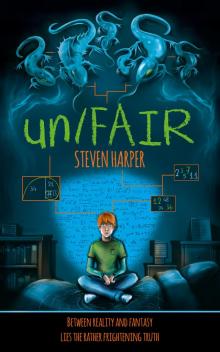 un/FAIR
un/FAIR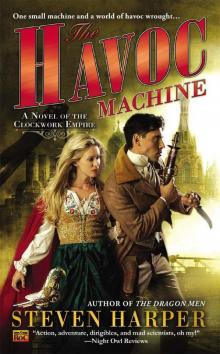 The Havoc Machine
The Havoc Machine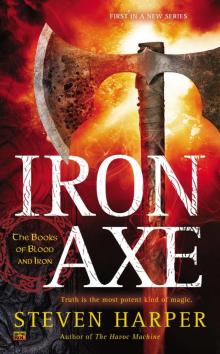 Iron Axe
Iron Axe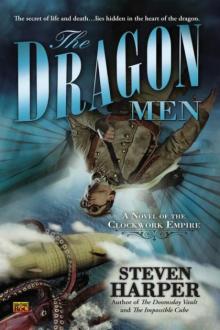 The Dragon Men
The Dragon Men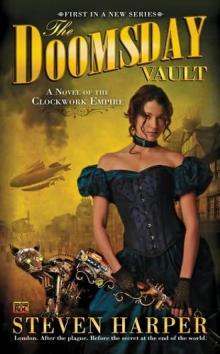 The Doomsday Vault ce-1
The Doomsday Vault ce-1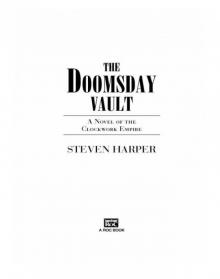 The Doomsday Vault
The Doomsday Vault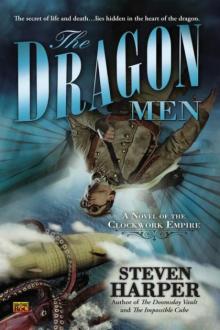 The Dragon Men ce-3
The Dragon Men ce-3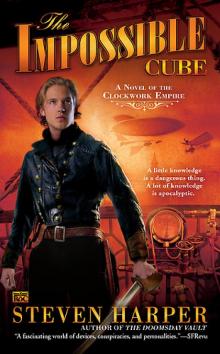 The Impossible Cube
The Impossible Cube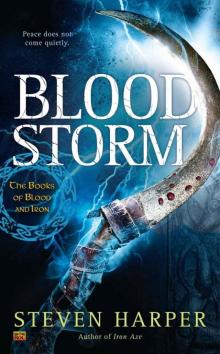 Blood Storm: The Books of Blood and Iron
Blood Storm: The Books of Blood and Iron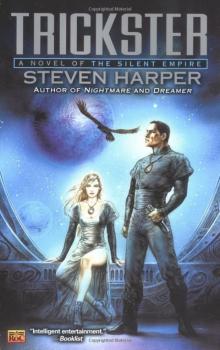 Trickster se-3
Trickster se-3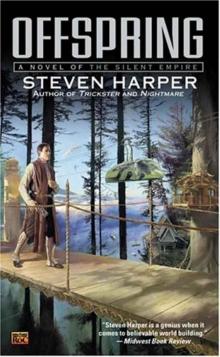 Offspring
Offspring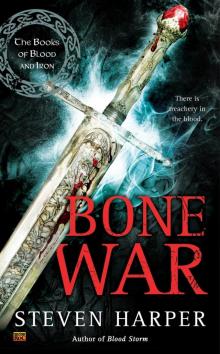 Bone War
Bone War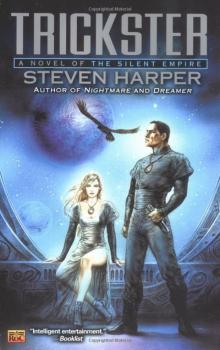 Trickster
Trickster Unity
Unity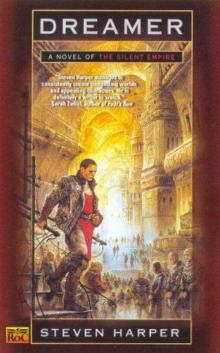 Dreamer
Dreamer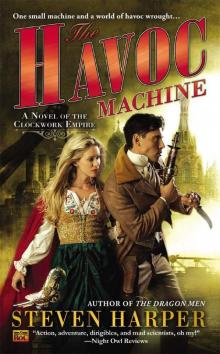 The Havoc Machine ce-4
The Havoc Machine ce-4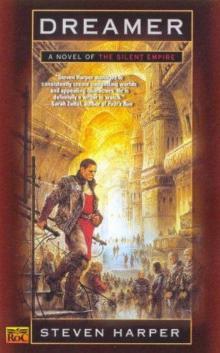 Dreamer se-2
Dreamer se-2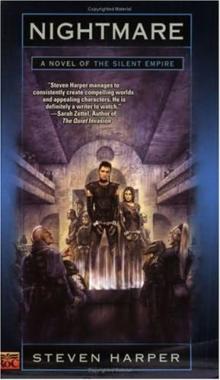 Nightmare se-2
Nightmare se-2